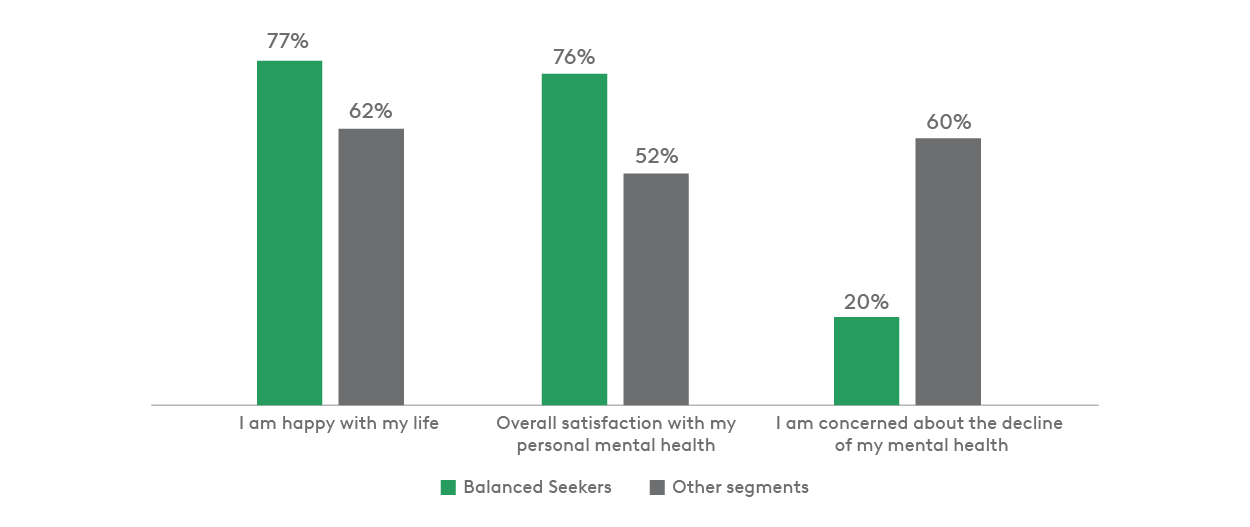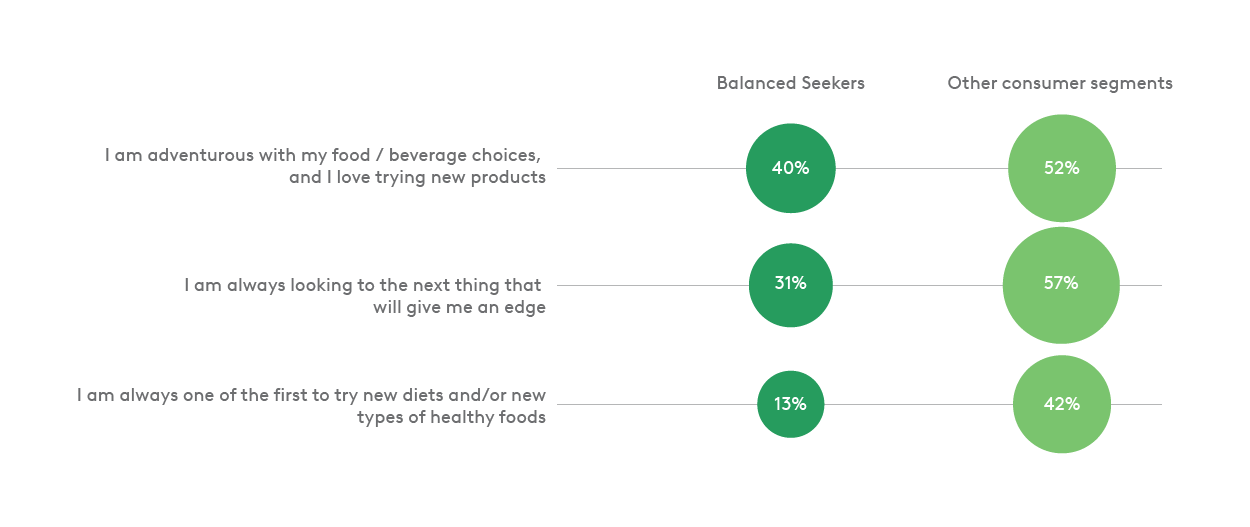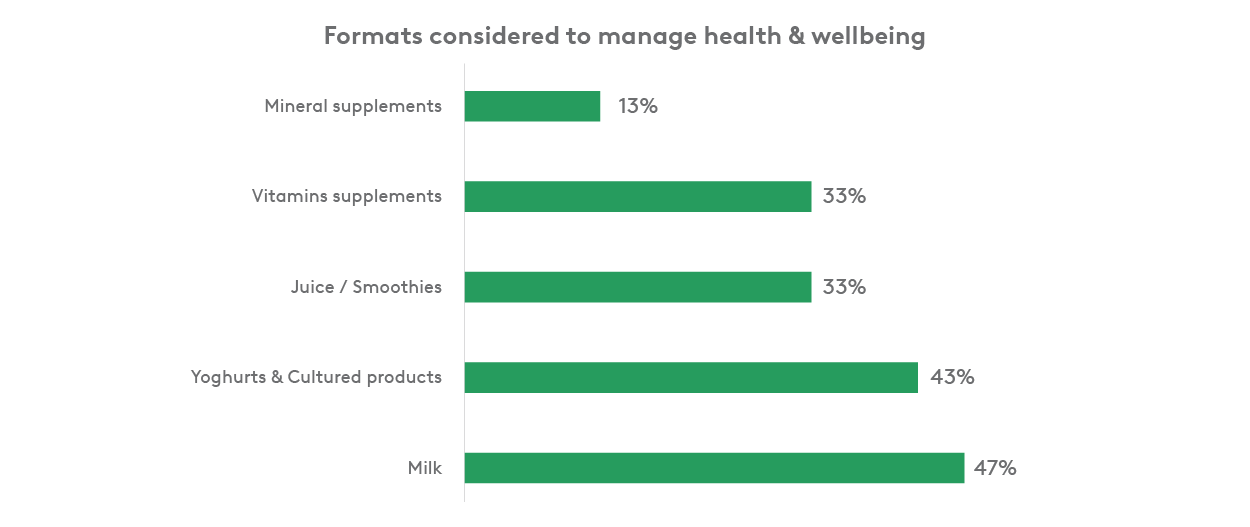SUGGESTED SEARCHES
Consumer Deep Dive Series: The Balanced Seekers
Consumer Deep Dive Series: The Balanced Seekers
The Global State of Health & Wellbeing – Volume 2
This is Part 5 of 5 of our Consumer Deep Dive Series, an article series on the consumer segments identified in The Global State of Health & Wellbeing Report - Volume 2. Read Part 1 ,Part 2, Part 3 and Part 4.
Every consumer is different, and comes with their own needs, habits, and health concerns. To best engage with them, brands must take time to understand who they are, and how to tailor solutions to reach them. In this final article of our Consumer Deep Dive series, we explore the behaviours and practices of Balanced Seekers, who make up 22% of the global health-conscious consumers identified in our Consumer Segmentation Report.
Of all the consumer groups identified, Balanced Seekers are the most satisfied with life overall, and with their personal mental health.

Figure 1: A comparison of Balanced Seekers’ attitudes towards life, against the other four segments
Three quarters of the group is made up of people aged 45 years and older, which plays into a growing body of research showing people tend to become happier and more satisfied with their lives as they age. Some studies cite an increase in oxytocin or improvement in mental health with age, while other scholars suggest that older adults are simply better at managing stress, which allows them to feel easily content.
Balanced Seekers are also more highly represented among the 18 - 34 year old segment in China and Korea than other countries. While Balanced Seekers make up just 4% of all consumers in China and 10% in South Korea, it is interesting to note this younger demographic that identifies with the Balanced Seeker values of letting go of the need to control life’s outcomes. Young people from these countries are instead shifting their focus to maintaining routines, by adopting small, simple healthy habits. Whatever their age, stage, location and culture, Balanced Seekers have an overall holistic outlook on health and wellbeing. A majority (7 in 10) is already doing what they can to regularly consume healthy, nutritious food and a diverse diet.
As they already accept that nutrition is vital to maintaining overall health and wellbeing, and they are generally satisfied with their health, how can brands inspire Balanced Seekers to seek out new nutrition products?

Figure 2: A comparison of Balanced Seekers’ attitudes towards trying new foods against other consumer segments
Choose Happiness
A healthy diet is just one road to wellbeing for Balanced Seekers. Many of them also believe getting sufficient sleep and spending time on the activities they enjoy contribute to overall improved wellbeing. Afterall, more than 8 in 10 believe that life is about finding balance and 57% say they aim to live life to the fullest.
For Balanced Seekers, this may mean engaging in mindful activities they love, such as walking (89%), gardening (56%) or walking with their pets (28%). Their focus on life’s experiences means that they see nutrition as an investment in their health allowing them to feel energised, spirited and enjoy every day.
Due to their attitude towards nutrition, they prefer to consume more complete and integrated solutions that offer broad health support, instead of numerous supplements that target specific health conditions. Given this segment’s tendency to experience bone and joint pains, generic multifunctional solutions that offer added mobility and flexibility support would best appeal to them. Another important attribute they look for when shopping for nutritious food is also a lack of side-effects so their daily life activities are not hindered.
Brands can help empower Balanced Seekers to address these concerns through clearly explained and targeted solutions that will help them continue to live life to its fullest. One example of such a solution would be Anlene’s Total 10 milk powder that is loaded with crucial, science-backed ingredients such as phospholipids, folate, and protein to help users improve mobility and maintain overall day-to-day wellbeing.
Accessibility Appeals
The price of healthy food and beverage emerged as a top barrier for Balanced Seekers, with 36% recognising affordability as a challenge. A third of the segment has already retired, and this, coupled with rising costs of living, means the accessibility of nutritious food is even more important for Balanced Seekers.
Did You Know?
The top 3 attributes that Balanced Seekers consider when choosing healthy food and beverages are: Great Taste (39%), Freshness (36%), and Value-For-Money/Price (28%).
Traditional product formats that can be paired with a meal
Great taste and freshness are within the top three attributes that Balanced Seekers look for when they are shopping for food and beverages. They are also highly traditional in their diets, preferring natural or less processed foods, without preservatives or additives. However, if the foods are fortified with vitamins and antioxidants, Balanced Seekers are more likely to be drawn to them.
Balanced Seekers prefer to eat home-cooked, unprocessed meals. When they turn to fortified products, they are usually in easy-to-consume formats that can be incorporated into their current diet and routines. These formats may include milks, juices, smoothies, yoghurts, and vitamin supplements.

Figure 3: The top formats preferred by Balanced Seekers to manage their health and wellbeing
Share via traditional media and word of mouth
While they may experience some health concerns such as obesity, stress, and joint pain, Balanced Seekers wouldn’t necessarily seek out professional advice as 80% believe they are the best person to care for themselves. Many of them rely on their own instincts or past experiences to navigate their health and wellbeing, and more than half say they are overwhelmed by the amount of information on food and beverages, which may discourage them from researching solutions to their health conditions.
This makes Balanced Seekers a more difficult group of consumers to reach, however, brands looking to share their latest findings and products with Balanced Seekers should firstly meet them where they are, via traditional media channels like newspapers and television.
Balanced Seekers also rely heavily on recommendations from people they trust. Therefore, partnering with present customers for reviews or referrals within their social circles will help build trust among Balanced Seekers.
The bottom line for appealing to Balanced Seekers
In conclusion, Balanced Seekers recognise that not every health problem can be solved through diet and take balanced steps to mitigate health conditions, preferring traditional, less costly methods of keeping health in check, such as eating less processed foods or home-cooked meals.
Brands can reach them via referrals in their social circles and traditional media platforms. They are more likely to turn to holistic and affordable solutions in traditional formats that can be paired with a meal. Added benefits that support mobility and flexibility, which are more of a concern to the group above 45 years old, would also be of interest to Balanced Seekers, especially when brands can connect the act of addressing these concerns with making the most of every day.
Despite their overall satisfaction with their current state of the mental and physical health, Balanced Seekers are still informed consumers who are active participants in their own overall wellbeing. They pose an exciting challenge for brands to develop innovative and enticing solutions that help them live even healthier and more fulfilling lives.
As a wellbeing nutrition brand, we help customers navigate the diverse needs of their consumers and work closely with them to tailor solutions that resonate with all groups. If you’re interested in launching a new nutrition product, please reach out to us to learn more about how we can help.
STAY AHEAD



